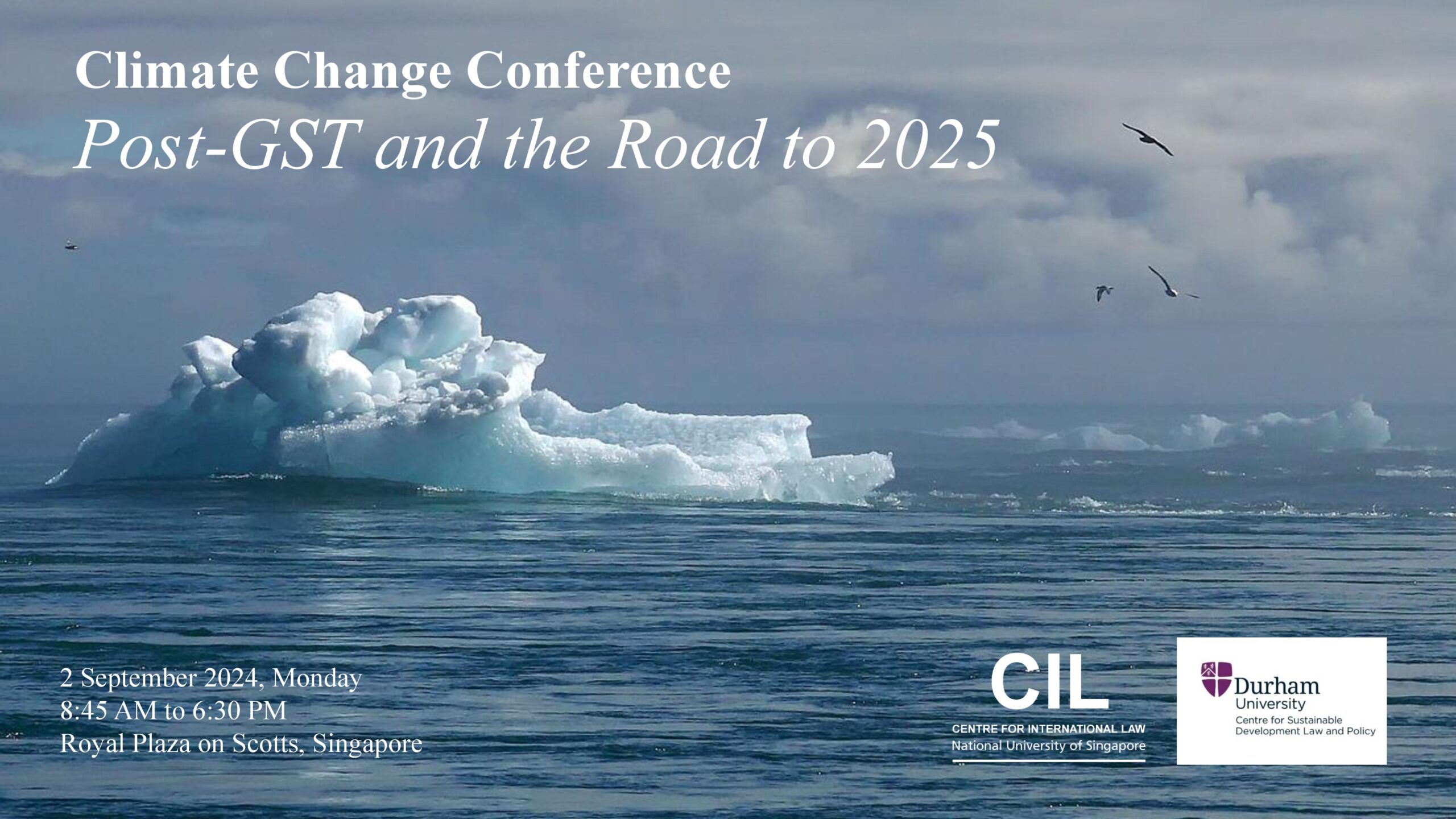Venue
Start
End
Time


6.0 Public CPD Point
Practice Area: Others/Multi-disciplinary” (Environmental Law)
Training Category: General
Participants who wish to obtain CPD Points are reminded that they must comply strictly with the Attendance Policy set out in the CPD Guidelines. For this activity, this includes signing in on arrival and signing out at the conclusion of the activity in the manner required by the organiser, and not being absent from the entire activity for more than 15 minutes. Participants who do not comply with the Attendance Policy will not be able to obtain CPD Points for attending the activity. Please refer to http://www.sileCPDcentre.sg for more information.
COP 30 in 2025 will be a pivotal moment and a critical juncture for the climate movement as Parties submit their 2nd Nationally Determined Contributions which will cover implementation until 2035. As the outcome of the first global stocktake markedly pointed out, Parties are not yet on track towards achieving the purpose and long-term goals of the Paris Agreement and in fact, are dangerously close to completely failing it. In 2023, studies have shown that on average, the Earth was 1.5C higher than pre-industrial times, the first time ever that this threshold was reached. The next few years will therefore be crucial in raising ambition for the next period while accelerating implementation of existing commitments.
The first global stocktake, aside from marking the progress of Parties NDCs, also made important policy signals to guide Parties in achieving the goals of the Paris Agreement. For example, the global stocktake outcome is the first formal UNFCCC document that mentions transitioning away from fossil fuels. The outcome also included an agreement to triple the world’s renewable energy capacity and double its energy efficiency by 2030. The outcome also stressed the importance of just transition pathways and financial flows that are consistent with a pathway towards low greenhouse gas emissions and climate-resilient development. The first global stocktake also referenced the potential of the ocean to contribute to mitigation and adaptation with Parties called to preserve and restore the oceans and coastal ecosystems and scale up ocean-based mitigation action.
This Conference, co-hosted by the NUS Centre for International Law (CIL) and the Durham University Centre for Sustainable Development Law and Policy (CSDLP), will build on the outcomes of the Global Stocktake and dive deeper into these issues and identify ways in which Parties can increase ambition and align their next NDCs toward the 1.5C goal. It aims to address the implications of just transition and how these can be integrated into NDCs; recent developments that promote as well as the challenges in achieving the urgently climate finance flows consistent with a pathway towards low greenhouse gas emissions and climate-resilient development; the translation of international climate change into domestic law and polices and the mechanisms available for monitoring and securing compliance; as well as the role of the oceans in climate action. The Conference will also take a forward-looking approach as it reviews the achievements and failures of the past to ask what the future of the international climate regime past 2030 and beyond will look like.
List of Confirmed Speakers:
-
- Dr. Nilufer Oral (Director, NUS Centre for International Law and Member, International Law Commission)
- Honourable Justice Brian Preston (Chief Judge, Land and Environment Court of New South Wales)
- Mr. Joseph Teo (Chief Negotiator for Climate Change, Singapore)
- Ms. Diane Tan (Deputy Director-General, International Affairs Division, Attorney-General’s Chambers of Singapore)
- Mr. Peter Govindasamy (Senior Director, Climate Change International Team, Singapore Ministry of Trade and Industry)
- Ms. Aldilla Rakhiemah (Project Manager, ASEAN Climate Change and Energy Project, ASEAN Centre for Energy)
- Prof. Petra Minnerop (Director, CSDLP and Professor of International Law, Durham University)
- Prof. Damilola Olawuyi (Independent Expert, UN Working Group on Business and Human Rights and Full Professor and UNESCO Chair on Environmental Law and Sustainable Development, Hamad Bin Khalifa University)
- Prof. Laura Marsiliani (Director, Centre for Environmental and Energy Economics, Durham University)
- Prof. Jolene Lin (Director, Asia-Pacific Centre for Environmental Law and Associate Professor, NUS Faculty of Law)
- Prof. Pasha Hsieh (Professor of Law and Jean Monnet Chair in EU-ASEAN Law and Relations, Singapore Management University School of Law)
- Ms. Sim Ting (Managing Director, Head of Corporate Services Group, and General Counsel, GenZero)
- Mr. William McGoldrick (Regional Managing Director, Asia Pacific, The Nature Conservancy)
- Dr. Madhu Rao (Director and Senior Advisor, Wildlife Conservation Society, Chair, IUCN World Commission of Protected Areas)
- Dr. Tanghua Li (Senior Research Fellow, Earth Observatory of Singapore, Nanyang Technological University)
- Ms. Denise Cheong, Head, Energy Law & Policy, NUS Centre for International Law
- Ms. Danielle Yeow (Lead, Climate Change Law and Policy, NUS Centre for International Law)
- Ms. Railla Puno (Associate Lead, Climate Change Law and Policy, NUS Centre for International Law)
This Conference is in-person only. Spaces are limited. Guests who are successfully registered will receive a confirmation email from the organisers in due course.
REGISTRATION Form closes at 1:00 pm on 16 August 2024, Singapore Time
Sorry. This form is no longer available.

